A viral social media post which details the price buildup of per liter petrol, mentions that state governments are collecting way more in the form of taxes than the central government. Through this article, let’s fact-check the veracity of the price buildup.
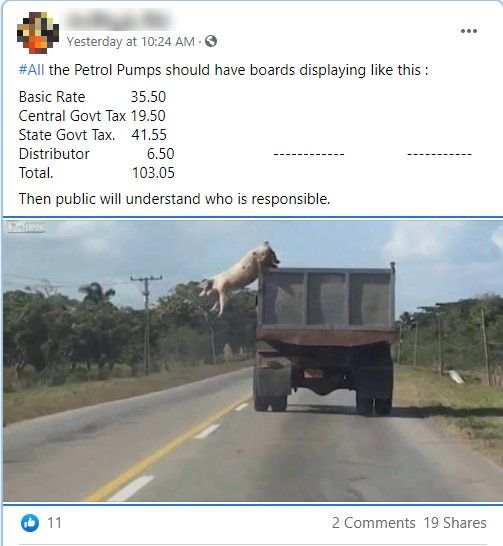
Claim: State government is collecting more tax than central government on petrol.
Fact: For every liter sale of petrol in the country, the central government receives Rs. 32.31 (cess + central share of BED). Whereas for every liter sale in the state the Telangana, government will receive Rs. 26.78 (State tax + state’s share of BED). Which implies central government tax is more compared to the state. Hence, the claim made in the post is FALSE.
As per the latest information available on PPAC (Petroleum Planning & Analysis Cell) regarding the price buildup of liter petrol in any HPCL Petrol bunks in Delhi, the price of liter petrol to dealers as of 01 July 2021 was Rs. 39.33 and the dealer commission was Rs. 3.82 per liter. While the central excise duty stands at Rs. 32.90, the state tax, which is 30% in Delhi amounts to Rs. 22.82.
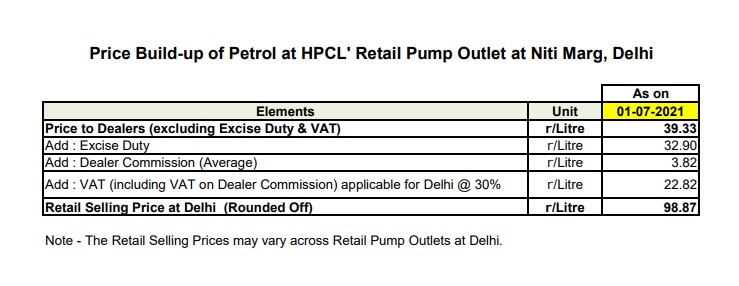
Central Govt Tax:
The central government levies excise duty on petrol in the form of Basic Excise Duty (BED), Special Additional Excise Duty (SAED), Additional Excise Duty (Road & Infrastructure) (AED), and the newly introduced Agriculture & Infrastructure Development Cess (AIDC).
Of these, Special Additional Excise Duty (SAED) was introduced by the Finance Act 2002. However, as per the act, the amount of excise duty levied under SAED is levied in the form of surcharge and the amount levied goes to the centre and not distributed to the states. In other words, the amount collected through this Special Additional Excise Duty (SAED) is not included in the divisible pool and hance the states would not have any share in it.
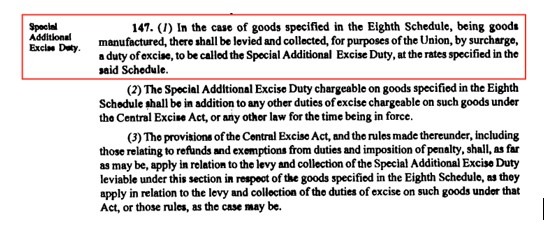
Additional Excise Duty (AED) on petrol was introduced by the Finance Act 1998, also known as Road & Infrastructure Cess. The amount collected through additional excise duty under the Finance Act 1998 also goes entirely to the Central Government as it is levied for a pre-determined purpose in the form of Cess. So states will not have any share in AED. Similarly, AED was introduced on diesel through the Finance Act 1999. The states do not have a share even in this.
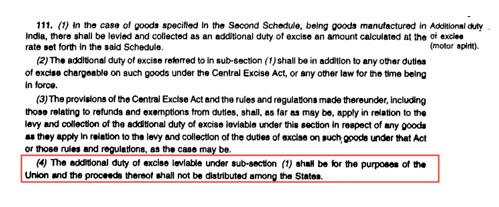
The Agriculture & Infrastructure Development Cess (AIDC) which was recently introduced in the 2021-22 budget is collected in the form of a cess for a pre-determined purpose (Agricultural Infrastructure) and hence states won’t be entitled to any share in the amount collected in the form of AIDC.
As a result, only the Basic Excise Duty (BED), is included in the divisible pool of which states have a share. The current rate of taxes through these forms can be viewed in the below table.
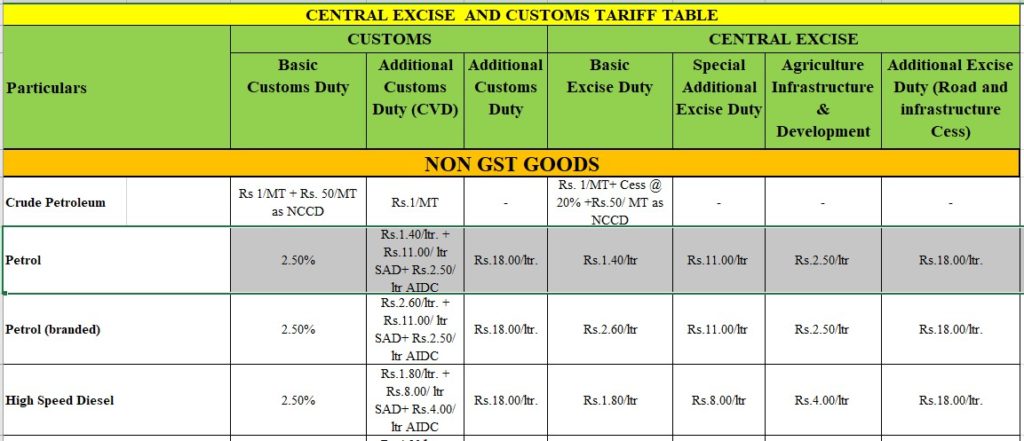
From the above table, we can infer that the sum of Rs. 31.50, which is collected in the form of Special Additional Excise Duty (SAED, Additional Excise Duty (Road & Infrastructure) (AED), and Agriculture & Infrastructure Development Cess (AIDC) per liter petrol are entirely retained by the central government and the states do not have any share in it. On the other hand, the amount Rs. 1.40, which is collected in the form of Basic Excise Duty is the only component that falls under the divisible pool, wherein the states get a share.
The 15th Finance Commission recommended that states should get 41% out of the divisible pool of taxes that the central government collects. This means the states receive 41% (i.e. Rs. 0.59) of the Rs. 1.40 Basic Excise Duty and the remaining 59% (i.e. Rs. 0.81) will reach the central exchequer. The sum of the total quantum of tax which central government receives per liter petrol is Rs. 32.31 (Rs. 31.5 + Rs. 0.81). This is static and the same for every state. i.e for every liter sale of petrol in the country, the central government receives Rs. 32.31 as central excise duty.
State Govt Tax:
Each state follows its own formula to levy a state tax on the sale of petrol and diesel in their respective states. For example, states like Telangana, Karnataka, Odisha, etc. just levy VAT on petrol & diesel, whereas few states collect cess, fixed charges, additional charges along with the VAT.
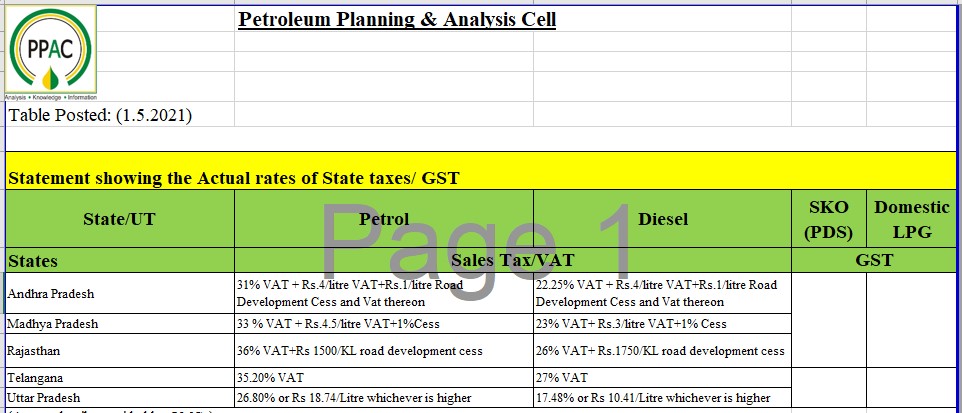
As far as Telangana is concerned, the state government levies 35.20% VAT on liter petrol. According to the price buildup mentioned at the beginning of the article, Telangana state’s 35.20% VAT would amount to Rs. 26.77. In addition to this, the state government would receive its share from the divisible pool of central taxes. In this case, the state government receives its share out of the basic excise duty.
As per the 15th Finance Commission recommendations, states would receive 41% out of the divisible pool. However, each state does not receive 41%, but they receive their respective proportion out of the 41% as recommended by the Finance commission. The commission has recommended 2.13% as Telangana’s share, which means Telangana government would receive 2.13% of Rs. 0.59, which amounts to Rs. 0.01 (one paisa) on liter petrol as their share of basic excise duty. This sums up the total quantum of tax which the state government receives on per liter petrol to Rs. 26.78 (Rs. 26.77 + Rs. 0.01).
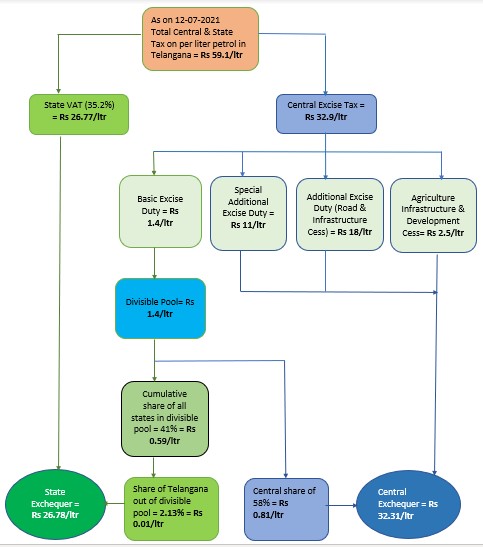
To sum it up, the central government collects more tax on petrol than the state government.


